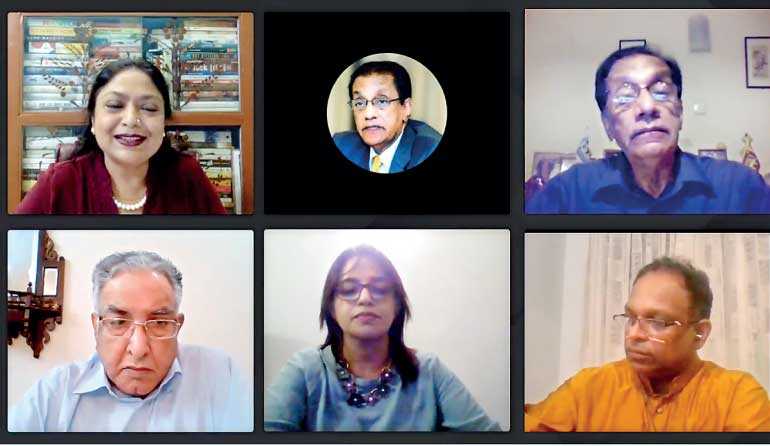Thursday Feb 26, 2026
Thursday Feb 26, 2026
Monday, 13 July 2020 01:09 - - {{hitsCtrl.values.hits}}

Bottom row (from left): Federation of Indian Export Organisations (FlEO) India Chairman – Northern Region Ashwani Kumar, GCPIT Sri Lanka Chairperson Ayanthi Gurusinghe, and Federation of Chambers of Commerce and Industry of Sri Lanka (FCCISL) Secretary General/CEO Ajith D. Perera join COSMI Founder/President Nawaz Rajabdeen (top row, centre, and right) on 9 July during ‘Indo Sri Lanka International Trade, Investment, Technology Transfer Cooperation’
Sri Lankan SMEs have issued a siren call to their Indian counterparts for sustainable cross-border joint ventures last week.
The invitation, issued via the online global leadership platform ‘Indo Sri Lanka International Trade, Investment, Technology Transfer Cooperation’ on 9 July, conducted by the Confederation of Indian Micro, Small and Medium Enterprises (CIMSME), called Indian SME investors to partner in six frontline segments in Sri Lankan on joint venture – metal, food processing, coconuts, tea, rubber and plastic.
“We are thinking of bringing in new technology and machinery from India to revive Sri Lanka’s sick industries. Metal industries, food processing, coconut, plastic, rubber, and value addition for tea are high potential sectors for partnership for Indian investors.
“Members of CIMSME can join us in this. We at Confederation of Micro, Small and Medium Industries (COSMI) can form affiliations with SIMSME to support our SMEs. We can also facilitate our SMEs to visit and see Indian machinery and technologies with a view to acquire them to be competitive locally and globally. Our Prime Minister Mahinda Rajapaksa has endorsed public private partnerships to advance our SMEs,” said COSMI Founder President Nawaz Rajabdeen on 9 July.
Representing Lankan SMEs at this pioneering global leadership session by India’s CIMSME, titled ‘Indo Sri Lanka International Trade, Investment, Technology Transfer Cooperation’, Rajabdeen also voiced that many women entrepreneurs are not coming forward to register their SMEs. “COSMI has requested the Government to ask the women entrepreneurs to come forward and register so that they can avail of a host of facilities including access to finance,” said Rajabdeen.
Joining the forum along with COSMI’s Rajabdeen, were GCPIT Chairperson Ayanthi Gurusinghe, Federation of Chambers of Commerce and Industry of Sri Lanka (FCCISL) Secretary General/CEO Ajith D. Perera, and President’s Counsel and lawyer Thisath Wijayagunawardane.
Speaking on his theme, titled ‘Cluster Development and its Challenges’, Rajabdeen said that non-tariff barriers (NTBs) have hindered Sri Lankan exports to India – some coming from local SMEs. “Most tariff barriers can be overcome through free trade agreements. However, non-tariff barriers have become a serious issue for the development of clusters that are keen to get to exports. Standards and regulations, such as conformity assessment procedures, inspecting, testing, and certifying for exports safeguard global consumers and their health but today, these procedures have turned to become non-tariff barriers (NTBs) on Sri Lankan exporters, especially of SME levels, and the effects are stressful on SME production clusters. Bilateral free trade agreements are seen as one way to overcome NTBs between trade partners. However, that, too, is not always fruitful.
For example the utilisation of India Sri Lanka Free Trade Agreement (ISFTA). The use of ISFTA by Sri Lankan exporters is only 65%. The reason is that even trade under the free trade agreement is locked with barriers. Non-tariff barriers hindering the prospects of free trade agreements.
Studies have identified Import policy barriers, standards, testing, packaging, and certification requirements, anti-dumping and countervailing measures, export subsidies and domestic support and government participation in trade as non-tariff barriers that block bilateral FTA trade. Even aside from FTA stipulations, administrative procedures are hindering exports. For example the Rules of Origin (ROO) ensures the goods are wholly produced from the country of export. In case goods are not under ROO criteria, ISFTA requires a combination of domestic value addition (DVA) and change of tariff heading (CTH).
“Value addition in the exporting country should not be less than 35% of freight on board (FOB) value of the finished product. Failing to show this results in that product removed from ISFTA and loses benefits of it,” said Rajabdeen.
India is Sri Lanka’s fourth largest export destination; 4,400 product lines have been given to Sri Lanka tariff free by India under free trade agreement; 65% of products exported from India to Sri Lanka comes in out of ISFTA.
“Many Sri Lankan clusters depend on some of their raw material coming as imported material. Requirements such as 35% domestic value addition hampers them from the very start. If they are unable to send their products as exports to their closest and neighboring market without 35% domestic value addition, it is clear that the popular belief that FTAs are helpful for cluster development may not be really true. For Sri Lankan SMEs and SME clusters, the great opportunity of free trade-based exports has also become their greatest obstacle!” Rajabdeen stressed.
The CIMSME is an Indian entrepreneur network consisting of more than 4,500 firms as members.
Sri Lankan exports to India have increased substantially in the past 18 years since 2000 – the year Indo-Sri Lanka FTA came into force.
In 2019, bilateral trade between India and Sri Lanka totalled to $ 4.59 billion. Exports from India to Sri Lanka surged from $ 600 million in 2001 to $ 4,495 million in 2018.
The Confederation of Micro, Small and Medium Industries (COSMI) was formed in 2019, and aims to revive and foster the MSME and industry sectors of Sri Lanka.